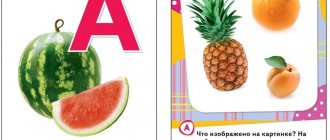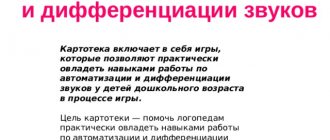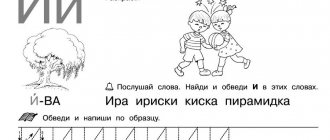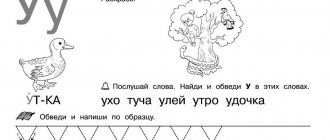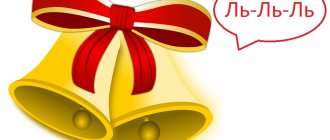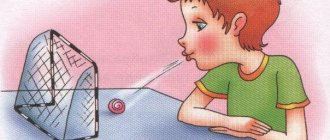Stories with pictures to automate the sound “L”
Stories with pictures to automate the sound “L” will help children learn to correctly say the sound in sentences and easily remember the text for retelling.
View the contents of the document “Alla and Glory.”
View the contents of the document "Squirrel and Woodpecker"
View the contents of the document "Wolf Cubs"
View the contents of the Blue Lamp document
View the contents of the document “A Doll for Lana”
View the contents of the document “The Moose and the Calf”
Viewing the contents of the document “Luntik and Mila”
Viewing the contents of a Spider-Man document
kopilkaurokov.ru
Sound automation [L]
The hard consonant sound [L] is colored blue (hard consonant). Vowel sounds are colored red.
The sound [L_] is pronounced for a long time and only with a motionless tongue (see articulation of the sound [L]).
1) Pronounce (read) syllables with the sound [L_]
Sample: al__, ol__, st__, yl__, el__, il__, el__, yol__, yul__, yal__
2) Pronounce (read) words with the sound [L] at the end
Sample: floor__, y-goal__
|
|
|
|
|
3) Pronounce (read) words with the sound [l] in the middle
Sample: floor, and head
|
|
|
|
4) Pronounce (read) the syllables L__A, A__O, L__U, L__Y, L__E
5) Pronounce (read) words with the sound [L] at the beginning
Sample: l__ak, l__a-pa
|
|
|
|
|
6) Pronounce (read) words with the sound [l] in the middle
Sample: ka-l__ach, sa-l__at
|
|
|
|
7) Pronounce (read) syllables
Sample: k-l__a, k-l__o, k-l__u, k-l__y
|
|
 Pronounce (read) words with a combination of consonants with the sound [L]
Pronounce (read) words with a combination of consonants with the sound [L]
Sample: f-l__ag, p-l__a-val__
|
|
|
|
9) Pronounce (read) words with two sounds [l]
Sample: f-l__ag, p-l__a-val__
|
|
|
|
10) Pronounce (read) phrases
Sample: SAMPLE: White ha-l__at
- Blue dress.
- Bright moon.
- Bad boat.
- Yellow scarf.
- Broken saw.
- Cold basement.
- Hungry wolf.
- Thick stick.
- Heavy hammer.
- Ripe strawberries.
- A warm coat.
- A spiky tree.
- Tin soldier.
- Golden ear.
- Blue eyes.
- Silk blouse.
- Deep well.
11) Conjugate sentences
- I ate milk noodles.
- I bought a notepad and chalk.
- I broke my bike.
- I was sailing on a boat on the waves.
- I ate ripe strawberries.
Sample:
- I drank cold milk.
- You drank cold milk.
- He (she) drank cold milk.
- We drank cold milk.
- You drank cold milk.
- They drank cold milk.
12) Say (read) sentences
Sample: Mi-l__a pi-l__a mo-l__o-ko
- There was a table next to the table.
- Volodya went to the collective farm.
- Alla bought a white dress.
- Mila carried the blue flag.
- A boat floats on the waves.
- Klava clapped her hands.
- Klusha swept the floor.
- The elephant has white tusks.
- The squirrel was sitting near the hollow.
- Klava bought onions and beets.
- Mila ate strawberries from a basket.
- Nikolai broke his bike.
- Volodya forgot where he put his pencil case.
13) Pronounce (read) pure sayings
- He sat down and ate everything.
- Near the bell stake.
- Klava deftly chopped the onion.
- Mom didn’t spare soap; mom washed Mila with soap.
- The stake is near the table, the table is near the stake.
- Polkan pushed the stick with his paw.
- Alyonka sat down in the corner - Alyonka had a lot to do.
- The nightingale is not great, but its voice is golden.
- Put off idleness, but don’t put off doing things.
- A cap under a cap, a cap under a cap.
- Here the cheerful bun rolled like a ball.
- Fyokla’s beets were wet and dry.
- Slava swam on a raft and caught roaches from the raft.
14) Pronounce (read) and retell the text
Naughty
Mila had a cat. He was completely white. Mila named him Belyak. Belyak was a big naughty man. One day Mom was knitting new socks for Mila. There was a ball on the table. Mom left the room and left the ball on the table. The white hare jumps onto the chair, from the chair onto the table, and let’s push the ball with his paws. The hare pushed and pushed the ball and tangled all the threads. Mila entered the room, saw a ball on the floor and said: “Oh, what a naughty man you are, Belyak!”
15) Say (read) poems
White snow, white chalk, The white hare is also white. But the squirrel is not white, the squirrel was not white.
Grandfather planted onions and grew an onion. The grandson saw the bow and tore off the forelock of the bow.
Klava deftly chopped onions, Lala washed the floor and shelves, Volodya knocked out the dust, Valya hammered nails, Kolya merrily sawed, Anatoly washed the forks, and little Sveta ate sweet candies.
- White hare, white hare! Where did you run after the bast? The white hare answered: “I didn’t run, I galloped.”
16) Pronounce (read) and memorize a poem
Automation of sound [L]. "Naughty Kitten" | Speech therapist via Skype
Content
Sound automation game [L] “Naughty Kitten”
(based on the book by L.N. Shinkarev “Games for automation and differentiation of sounds in preschool children”)
Purpose of the game:
- Automation of sounds [ C ], [Z], [Sh], [Zh], [R], [L], [L].
- Differentiation of sounds [ C ] - [Z] - [SH] - [Zh]; [R] - [L] - [L].
- Development of the lexical and grammatical structure of speech, in particular, training in the use of case constructions
Material:
Circles made of colored cardboard, painted to look like balls
".
Pictures of balls are cut out separately and glued.
Rules of the game "Kitten - Naughty"
The balls are laid out on the table. We explain to the child that the kitten scattered grandma’s balls. To prevent grandma from being upset, they need to be collected.
You can collect the balls in any beautiful box, or place them near the grandmother sitting in the chair, shown in the story picture.
To practice distinguishing (differentiating) sounds, you can ask the child to collect balls with pictures containing different sounds (for example, the sounds [C] - [Ш] or [Р] - [Л]) in different piles or different boxes.
You can ask the question: “What pictures did you collect?”, “What picture did the kitten hide?”, training in the use of the accusative case.
On the back of the glomeruli there are object pictures that the child must name correctly.
Game application: see below
The game was prepared by:
teacher speech therapist
Lyudmila Fedirko
MDOU Kindergarten No. 1 village. Aksha
I advise you to read more on this topic
logopedrunet.ru
Exercises
Let's start with classic exercises that are designed for children of preschool and primary school age. A professional speech therapist and a parent can conduct classes on this list of games at home.
Syllables
This is reading or repeating syllable tables. You need to do the task for 2-3 minutes several times during the day.
In direct syllables:
| LA LA LA | LE-LE-LO | LU-LU-LU | LI-LI-LY |
| LA LA LA | LO-LO-LE | LU-LU-LU | LY-LY-LI |
| LA LA LA | LO-LE-LO | LU-LU-LE | LY-LI-LY |
| LA LA LA | LE-LO-LE | LU-LU-LU | LI-LY-LI |
In reverse syllables:
| AL-AL-AL | OL-OL-OL | UL-UL-UL | EUL-EUL-EUL |
| AL-AL-AL | OL-OL-OL | UL-UL-UL | YL-YL-YL |
| AL-AL-AL | OL-OL-OL | UL-UL-UL | YL-YL-YL |
| AL-AL-AL | OL-OL-OL | UL-UL-UL | EUL-EUL-EUL |
The next step is to add another consonant or vowel to the syllable:
| PLAH-PLAH-PLAH | PLE-PLOE-PLO | PLU-PLU-PLU | PLI-PLI-PLI |
| PLA-PLA-PLA | PLO-PLO-PLO | PLU-PLU-PLU | PLY-PLI-PLI |
| PLA-PLA-PLA | PLO-PLO-PLO | PLU-PLU-PLU | PLAY-PLI-PLAY |
| PLAH-PLAH-PLAH | PLE-PLO-PLOE | PLU-PLU-PLU | PLI-PLI-PLI |
| ALA-ALA-ALA | OLE-OLE-OLO | ULU-ULU-ULU | YLI-YLI-YLY |
| ALA-ALA-ALA | OLO-OLO-OLO | ULU-ULU-ULU | YLY-YLY-YLY |
| ALA-ALA-ALA | OLO-OLO-OLO | ULU-ULU-ULU | YLY-YLY-YLY |
| ALA-ALA-ALA | OLE-OLO-OLE | ULU-ULU-ULU | YLI-YLY-YLI |
It is important not to rush when reading syllables, but to monitor the clarity of the pronunciation of the sound, its softness and hardness.
Words
Use open and closed syllables in words to create speech therapy cards. Form examples in rows of 3-4 pieces each:
Dust - dust - bullet - they sang.
Lyalya – Lolla – Lika – Lena.
Syllable – elephant – clone – full.
Varnish – flag – fist – bench.
Soaped - lathered - washed - swept.
For a number of words, it is important to select examples that sound similar in sound so that the child develops phonemic awareness.
Collocations
The preschooler slowly repeats word combinations after the teacher; increase the complexity of the examples at each lesson, but gradually. If the child cannot cope, does not repeat the words clearly, return to the previous level and practice the material already covered until it becomes automatic.
School ball; Green meadow; Favorite carrot; Toilet soap; Cold floor; Ice puddle; Warm summer; Caught a moth; Ate a lemon; Forest lily of the valley; Gold ring.
Offers
For preschool children, it is enough to include 3-4 words in sentences for repetition.
Our Julia is a fidget. Kolya has a flag. There is a quinoa in the clearing. Planes are flying far away. Kolya pricked stakes. There is an ear in the fist. Lolla and Lika divide everything in half. There is a deer in the field.
On a note! Invite your child to put together sentences independently from the pictures, and then repeat them. For example, put the following set of cards on the table: lemon, elephant, and the written verb loves. It turns out that the elephant (does not) like lemon.
Puzzles
Interesting riddles must not only be guessed, but also memorized.
I dug the ground, I wasn’t tired at all. The one who dug for me is tired. (Shovel)
White on white, trampled where he ran. The red-haired one will pass by and read the tracks. (Fox and hare)
Here are the pins and needles crawling out from under the bed. Their eyes are looking at me, they want to ask for milk. (Hedgehog)
Poems
Poetic texts are an effective method of eliminating speech disorders in children of different ages. For preschool children, suggest learning 1-2 quatrains and large rhyming sketches at least once a week.
It's raining! Drops are dancing in a puddle! The raft is floating! Nobody needs! The little frog climbed onto the raft! And yells: “Hurray! Forward!".
I love blueberries, I love strawberries, I love viburnum, I love strawberries.
There was a blue sky, There was a golden sun, A dog was lying on the porch, A guy was planting a tree. It was quiet and warm. Time passed slowly.
Do not forget to explain to children the meaning of unfamiliar words in poems, texts, and other exercises.
Proverbs
Small proverbs should be read or repeated after an adult:
- Even a small lie leads to a big one.
- Drop by drop the stone is chiseled.
- Don't boast about the beginning, boast about the end.
- The finger is weak, but the fist is strong.
- Finished the job, go for a walk safely.
- The little wolf will shed the tears of a sheep.
- Not all that glitters is gold.
- Slipped is not a fall yet.
After reading proverbs, talk with children about the meaning of the phrase, choose instructive and interesting examples according to the age of the students.
Tongue Twisters
It is better to write pure sayings in a notebook and memorize them. Advise parents to recite such sentences with their child during a walk, before bedtime, or in chorus with the whole family, so as not to turn the game into a strict lesson.
- The nightingale is small, but the voice is strong.
- Lena barely ate; apparently she didn’t want to eat out of laziness.
- And I was there, I heard that story.
- Galya wet her felt boots in the thawed patch. Galenka’s felt boots are drying on the heap.
- Being a housewife is not easy, the milk has run out.
- The linden tree has a linden leaf, the linden leaf is healing and the linden leaf is sticky.
- Right at the shallows we found a large burbot.
Stories
The task involves retelling close to the test. For preschoolers, choose short texts of Russian folk tales and instructive stories.
Masha
Masha was little, but she wanted to grow up faster. I decided to help my mother around the house in order to grow bigger faster. I walked in my mother’s shoes, put on her dress, but nothing helped.
One day Masha decided to sweep and wash the floor. Everyone was happy and surprised. Masha did everything well, and her mother asked: “Masha, have you really become so big that you can wash and sweep the floor?” And dad said: “Yes, but we didn’t even notice that our Masha had grown so much! Now we’ll call her big!”
Exercises
Differentiation [l], [l] will be more productive if you approach classes as a game. L.A. Komarova developed an original method of individual and group work with preschool children with speech disorders. This method is based on games with cards and flat toys (walkers). Kindergarten children hold a pointer or a Kinder toy in their hands, use auxiliary elements to navigate through cards with pictures, and complete tasks from a teacher or parent.
Puzzles
Adults name the characteristics of objects (external, taste, any others), and the preschooler guesses its name. In this case, the child is presented with options for the correct answer in pictures. For example, the teacher says: “Yellow, sour, oval...” (lemon). The baby points to an object and names it.
What's missing
Exercise develops memory and attention. Place a large card with images of objects on the table (no more than 9 pieces, you can start with 3-4 pictures). The child looks at the card and remembers that it shows 1-2 minutes. Then the teacher covers 1 picture, and the child says what is missing from the field.
Sound table for the sound L
| Words - hints: | elephant, | needle, | shark, | t-shirt, |
| dress, | Horse, | broom, | squirrel, | |
| donkey, | Christmas tree, | wolf, | Spoon, | |
| Onion, | crocodile, | Shovel, | bee |
1. Name all the objects in order “snake”, starting with the picture with an asterisk * (elephant, needle, shark, T-shirt, squirrel, broom, horse, dress...)
2. Place a chip on each item (you can use a button or a toy - “kinder”) and first add to the named item the phrase “I got up” :
I stood on an elephant I stood on a needle I stood on a shark, etc.
3. Name objects in pairs so that a living object is paired with a non-living object. For example, an elephant has a needle, a shark has a T-shirt, etc.
(pictures are selected in pairs: living object - inanimate object).
4. Name all the objects, adding living - non-living : elephant - alive, needle - non-living, etc.
5. Name the object on which you place the chip first in the SINGULAR , then coordinate it with the numerals TWO, FIVE : one elephant, two elephants, five elephants; one needle, two needles, five needles, etc.
6. Name each item in a diminutive form, if possible:
elephant - elephant, needle - needle, etc.
7. Color living objects yellow, inanimate objects blue.
8. Show and call elephant - yellow, needle - blue, shark - yellow, etc.
9. Name what is in the upper right corner; in the lower left corner; in the lower right corner; in the top left corner; in the top row second in a row; in the bottom row third in a row; first in the second row; between, above..., under... etc. (the task can be of any complexity).
10. Come up with one sentence for each subject.
(complicated version of the task: come up with sentences using two words from the sound table, for example, elephant and needle - elephant threads a needle)
Make sure you pronounce the L sound correctly!
Author of the material: Inga Didkovskaya
Also on the topic: “Automation of sounds”
logoped18.ru
